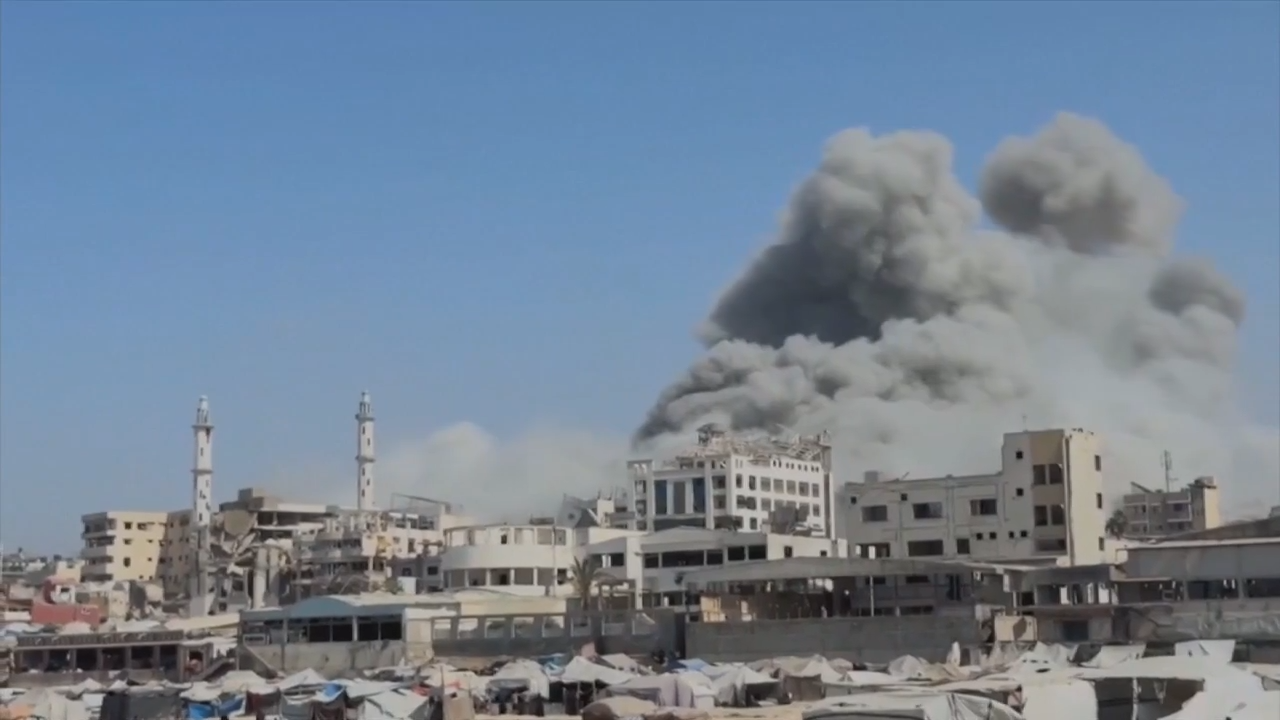**Israel Strikes Gaza After Ceasefire Violation; Talks on Second Phase of Negotiations Begin**
*Tel Aviv, Israel (AP)* — Israel on Sunday struck targets in the southern Gaza Strip after reporting that its troops came under fire from Hamas militants. This confrontation marks the first major test of a U.S.-brokered ceasefire aimed at halting more than two years of ongoing conflict.
According to the Israeli military, members of the Palestinian group fired a rocket-propelled grenade (RPG), prompting Israel to respond with airstrikes and artillery. Prime Minister Benjamin Netanyahu held consultations with Israel’s security chiefs and directed the military to take “strong action” against any ceasefire violations but stopped short of threatening a return to full-scale war. Meanwhile, Hamas denied any involvement in the clashes in Rafah, located in southern Gaza.
—
**Hostage Remains Identified as Talks Progress**
The strikes coincided with Israel identifying the remains of two hostages released by Hamas overnight. Prime Minister Netanyahu’s office confirmed that the bodies belonged to Ronen Engel, a father of three from Kibbutz Nir Oz, and Sonthaya Oakkharasri, a Thai agricultural worker killed at Kibbutz Be’eri. Both were believed to have died during the Hamas-led attack on southern Israel on October 7, 2023, and their bodies were subsequently taken to Gaza.
Engel’s wife, Karina, and two of his children had been kidnapped during the attack and released in a ceasefire exchange in November 2023.
At the same time, Hamas announced that talks to launch the second phase of ceasefire negotiations have begun.
—
**Rafah Border Crossing Remains Closed**
Israel has threatened to keep the Rafah border crossing between Gaza and Egypt closed “until further notice.” Netanyahu’s office stated that reopening would depend on Hamas fulfilling its ceasefire obligations, particularly the return of the remains of all 28 deceased hostages.
In the past week, Hamas has handed over the remains of 13 bodies, 12 of which have been identified as hostages. Israel reported that one of the bodies released did not belong to a hostage.
In exchange, Israel has released 150 bodies of Palestinians back to Gaza, including 15 on Sunday, according to the Gaza Health Ministry, which is operated by the Hamas government. The ministry has neither identified the bodies nor released information on their causes of death. Many bodies displayed on the ministry’s website are decomposed, blackened, and some are missing limbs or teeth. So far, only 25 bodies have been positively identified.
—
**Hostage Exchanges and Ceasefire Challenges**
After exchanging 20 living hostages for more than 1,900 Palestinian prisoners and detainees, the handover of deceased hostages’ remains remains a critical issue in the first stage of the U.S.-proposed ceasefire, initially brokered by former President Donald Trump. A significant escalation in humanitarian aid, including reopening the Rafah border crossing to facilitate movement and aid access, is also on the agenda.
The next phases of the ceasefire negotiations will focus on disarming Hamas, Israeli withdrawal from additional areas they control in Gaza, and establishing future governance for the devastated territory.
—
**Second Phase of Negotiations Underway**
The Israeli military reported that militants fired at troops in Rafah, within Israeli-controlled areas near the agreed ceasefire lines. No injuries were reported. A senior Hamas official denied any involvement in the incident.
Both Hamas and Israel have accused each other of violating the ceasefire.
Meanwhile, Hamas confirmed the start of talks with mediators aimed at initiating the second phase of the ceasefire. Hazem Kassem, a Hamas spokesman, said in a statement late Saturday that these negotiations “require national consensus” and that Hamas has begun discussions to “solidify its positions,” without providing further details.
According to the current plan, these talks will include disarming Hamas and establishing an internationally backed authority to administer Gaza. However, Kassem reiterated that Hamas will not be part of the postwar governing authority.
In the meantime, Hamas-run government bodies continue managing Gaza’s day-to-day affairs to prevent a power vacuum. Kassem emphasized the importance of forming a Community Support Committee, made up of Palestinian technocrats, to oversee administrative duties, pending agreement among all Palestinian factions.
—
**Rafah Crossing Restrictions and Palestinian Procedures**
Israel did not open the Rafah crossing on Sunday, aiming to pressure Hamas into returning more remains. Hamas claims it requires special equipment to locate additional hostages’ bodies, but Israel suspects the group is withholding some remains.
Historically, the Rafah crossing was the only border between Gaza and Egypt not controlled by Israel before the war. It has remained closed since May 2024, after Israeli forces took control of the Gaza side. A fully operational crossing would enable Palestinians to access medical treatment, travel, and visit family in Egypt, which hosts tens of thousands of Palestinians.
The Palestinian Authority’s Interior Ministry in Ramallah announced new procedures Sunday for Palestinians traveling through Rafah. Those leaving Gaza will be issued temporary travel documents by embassy staff in Cairo to enter Egypt. Palestinians wishing to enter Gaza must apply for entry documents at the Cairo embassy.
—
**Casualty Figures and Ongoing Conflict**
The Israel-Hamas conflict has claimed more than 68,000 Palestinian lives, according to the Gaza Health Ministry — part of the Hamas government and considered a reliable casualty source by the U.N. and independent experts. Israel disputes these figures but has not provided its own official death toll. Thousands more remain missing, according to the International Committee of the Red Cross.
The initial Hamas-led October 7 attack killed approximately 1,200 people, mostly civilians, and resulted in 251 abductions, sparking the conflict.
—
**Hamas Rejects U.S. Claims of Planned Gaza Attack**
On Sunday, Hamas rejected a claim by the U.S. State Department that it had credible reports of an imminent planned attack by Hamas against Gaza residents.
“This planned attack against Palestinian civilians would constitute a direct and grave violation of the ceasefire agreement and undermine significant progress achieved through mediation efforts,” the U.S. statement said Saturday.
Hamas called these allegations “false” and accused Israel of supporting armed groups operating within Israeli-controlled areas. The Palestinian group urged the U.S. to pressure Israel to end support for these factions and cease providing them with “safe haven.”
Hamas-led fighters recently clashed with at least two armed groups involved in looting humanitarian aid and collaborating with Israel in eastern Gaza City. The militants publicly executed several suspects, actions widely condemned internationally.
The Gaza Interior Ministry, under Hamas control, reported that its forces are actively working to restore law and order in areas vacated by Israeli forces following the ceasefire.
—
*Copyright © Associated Press*
https://wsvn.com/news/us-world/israel-strikes-gaza-after-it-says-hamas-attacked-across-ceasefire-line/


